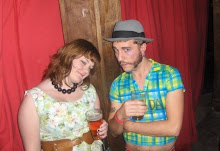I remember going on a trip to Theodore Roosevelt National Park when I was 11 years old with my father and my brother. There was a lot of hiking, and passing down of information from father to sons. After an intense climb my brother and I were hanging near the edge of a cliff when he suddenly lifted me up by my ankles, and dangled me over the edge. Looking down at the ravine below, I saw my life flashing before my eyes; the drop was at least 100 feet down. My dad, laughing, pulled out the camera to document this moment. He would later put this in a family photo album. The following Christmas when my sister came home for break from school, we were looking at the photos. She laughed at the picture of my brother and I in the North Dakota Badlands, “Male bonding!” she said.
Male bonding is always something I have had difficulty with. For as long as I can remember, I have gotten along better with women than men. Perhaps because of this stronger identification with women, I have come to find that identities such as “guy”, “boy”, and “male” resonate with me, but I have never felt comfortable with the identify of “man”. My gender identity embodies masculinity, while it is conflicted with the privileges associated with manliness. In situations where –mostly straight- men are the majority, I have often felt uncomfortable because I feel there is a competition. Playful or not, I have repeatedly seen this power struggle play out.
“Man” is not natural or inherent. It is political and infused with power; one is not born a “man”, one BECOMES a “man” –this is a reference to Simone de Beauvoir. If “man” were naturally occurring and not a social construction, then it would not be necessary to bestow upon someone as a rite of passage. “Man” would be a category we become with age, not an identity that the greater society oversees and declares real or not real, depending on who and how “man” is embodied.
“Man” is not a stable category. In this way, “man” is not much different from other categorical identities, in that there is no one-way to be a “man”. “Man”, historically, has shifted to meet the needs of the society. The idea of “man” is perhaps universal, however, the traits we associate with maleness are not.
As I stated two paragraphs ago, “man” is a political identity that exists for the accumulation of power. Many males contend with each other for the identity of “man”. The title of “man” is not permanent, and once given to a person, it can be stripped away. Men compete with each other for their right to the title, and attempt to present their manliness as undeniable. The parameters of what “man” is not, are defined by what is seen to be the ‘other’ to man. This does not, however, make clear what “man” is as the traits associated with “man” do not belong to “man”. If a person’s actions exist too far out of the blurred boundaries of “man”, they will be symbolically emasculated. This renders the person as less than man, which is the “other” to man.
Guy, male, and boy are not titles I have to prove. In part, this is because of my own cisgendered privilege. To clarify: my perceived gender, and my gender identity are not in direct conflict. I almost never have to clarify my identity as male, as this identity of maleness is assumed. My identity with guy, male, and boy as opposed to “man”, is simultaneously an attempt to divest myself of male privilege, and an avoidance of the repetitive need to prove my worth as a “man”. I do not care to remake “man”. I want to destroy it.
Monday, December 28, 2009
Subscribe to:
Post Comments (Atom)

No comments:
Post a Comment